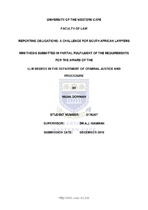| dc.contributor.advisor | Hamman, Abraham | |
| dc.contributor.author | Dowman, Nadia | |
| dc.date.accessioned | 2020-11-27T09:40:57Z | |
| dc.date.available | 2020-11-27T09:40:57Z | |
| dc.date.issued | 2019 | |
| dc.identifier.uri | http://hdl.handle.net/11394/7574 | |
| dc.description | Magister Legum - LLM | en_US |
| dc.description.abstract | “Threats to the independence of the legal profession have become a preoccupation
for bar leaders, regulators and academics, driven by the dual pressures of
globalization and the changing business structure of the profession.”1 Money
laundering is a transnational economic crime that has plagued the world economy for
many decades. It is a crime that eluded the attention of most world leaders. Hence, it
is this elusiveness and this non-interest in money-laundering as a serious economic
crime, that afforded many individuals such as former dictators and military leaders in
developing countries the chance to avoid prosecution for depleting the economic
resources of their particular state.2 | en_US |
| dc.language.iso | en | en_US |
| dc.publisher | University of Western Cape | en_US |
| dc.subject | Attorney | en_US |
| dc.subject | Attorney-client confidentiality | en_US |
| dc.subject | Money laundering | en_US |
| dc.subject | South Africa | en_US |
| dc.subject | Cash threshold reporting | en_US |
| dc.title | Reporting obligations: A challenge for South African lawyers. | en_US |
| dc.rights.holder | University of Western Cape | en_US |

